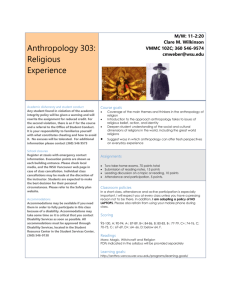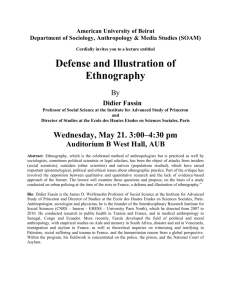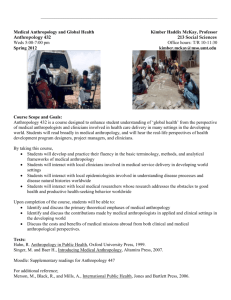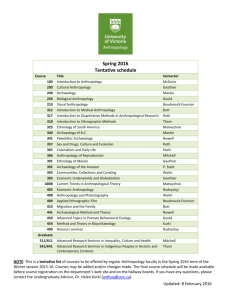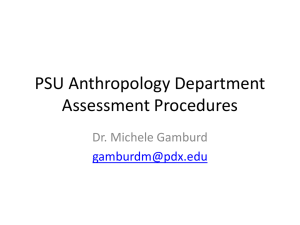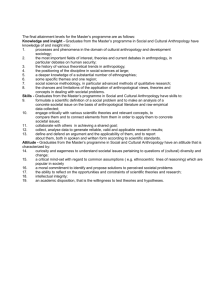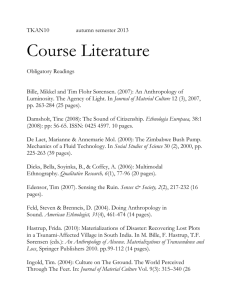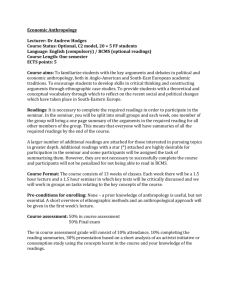Social Science Methods, Analysis and Research Training/
advertisement
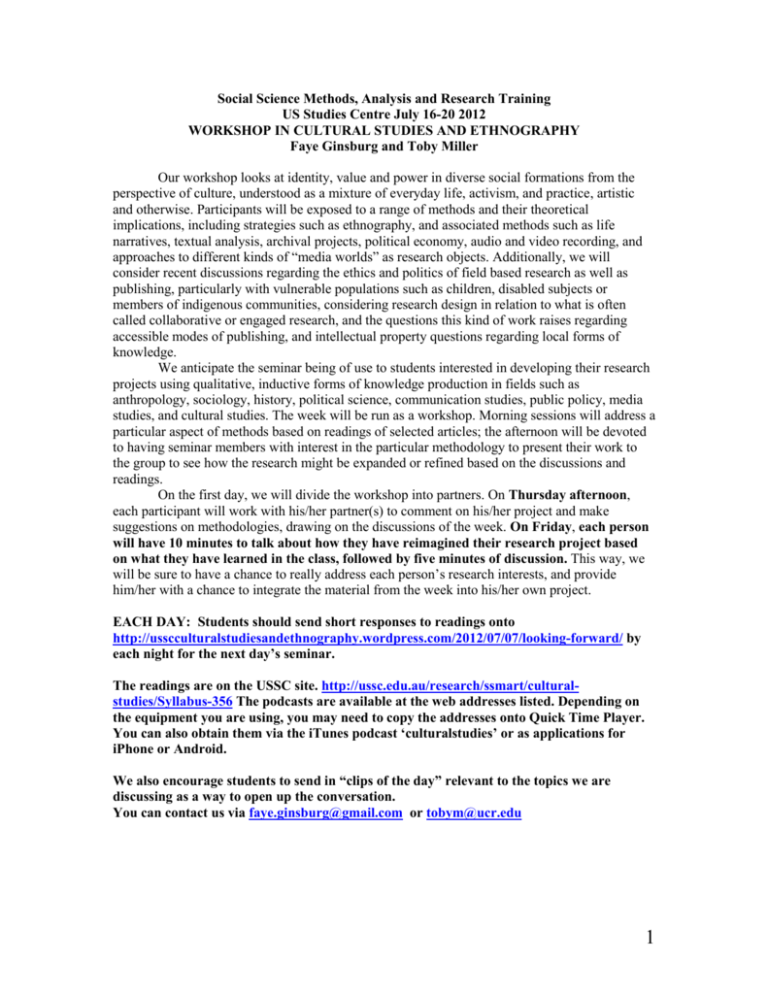
Social Science Methods, Analysis and Research Training US Studies Centre July 16-20 2012 WORKSHOP IN CULTURAL STUDIES AND ETHNOGRAPHY Faye Ginsburg and Toby Miller Our workshop looks at identity, value and power in diverse social formations from the perspective of culture, understood as a mixture of everyday life, activism, and practice, artistic and otherwise. Participants will be exposed to a range of methods and their theoretical implications, including strategies such as ethnography, and associated methods such as life narratives, textual analysis, archival projects, political economy, audio and video recording, and approaches to different kinds of “media worlds” as research objects. Additionally, we will consider recent discussions regarding the ethics and politics of field based research as well as publishing, particularly with vulnerable populations such as children, disabled subjects or members of indigenous communities, considering research design in relation to what is often called collaborative or engaged research, and the questions this kind of work raises regarding accessible modes of publishing, and intellectual property questions regarding local forms of knowledge. We anticipate the seminar being of use to students interested in developing their research projects using qualitative, inductive forms of knowledge production in fields such as anthropology, sociology, history, political science, communication studies, public policy, media studies, and cultural studies. The week will be run as a workshop. Morning sessions will address a particular aspect of methods based on readings of selected articles; the afternoon will be devoted to having seminar members with interest in the particular methodology to present their work to the group to see how the research might be expanded or refined based on the discussions and readings. On the first day, we will divide the workshop into partners. On Thursday afternoon, each participant will work with his/her partner(s) to comment on his/her project and make suggestions on methodologies, drawing on the discussions of the week. On Friday, each person will have 10 minutes to talk about how they have reimagined their research project based on what they have learned in the class, followed by five minutes of discussion. This way, we will be sure to have a chance to really address each person’s research interests, and provide him/her with a chance to integrate the material from the week into his/her own project. EACH DAY: Students should send short responses to readings onto http://usscculturalstudiesandethnography.wordpress.com/2012/07/07/looking-forward/ by each night for the next day’s seminar. The readings are on the USSC site. http://ussc.edu.au/research/ssmart/culturalstudies/Syllabus-356 The podcasts are available at the web addresses listed. Depending on the equipment you are using, you may need to copy the addresses onto Quick Time Player. You can also obtain them via the iTunes podcast ‘culturalstudies’ or as applications for iPhone or Android. We also encourage students to send in “clips of the day” relevant to the topics we are discussing as a way to open up the conversation. You can contact us via faye.ginsburg@gmail.com or tobym@ucr.edu 1 BACKGROUND READINGS: Néstor García Canclini. 2008. Interview for the 9th Spanish Sociology Conference, 2007. Social Identities. 14 (3) 389-94 Chartier, Roger. 2004. Languages, Books, and Reading from the Printed Word to the Digital Text Critical Inquiry 31 Cunningham, Stuart. 2010. Trojan Horse or Rorschach Blot? Creative Industries Discourse Around the World. International Journal of Cultural Policy Eco, Umberto. 1979, Introduction to The Role of the Reader Frow, John. 2005 Australian Cultural Studies: Theory, Story, History Australian Humanities Review 37 Ginsburg, Faye, Lila Abu-Lughod, and Brian Larkin. 2002. Introduction. Media Worlds: Anthropology on New Terrain. California. 1-36 Hall, Stuart. 1990. The Emergence of Cultural Studies and the Crisis of Humanities. October 53 Marcus, George. 2007. Ethnography Two Decades After Writing Culture. Anthropological Quarterly 80(4): 1127-45 Martín-Barbero, Jesús. 2006. A Latin American Perspective on Communication/Cultural Mediation Global Media and Communication 2 (3): 279-97. Miller, Toby. 2006. What it is and what it isn’t. Introducing….Cultural Studies. In A Companion to Cultural Studies. Blackwell, 1-20. Miller, Toby. 2009. Can Natural Luddites Make Things Explode or Travel Faster? The New Humanities, Cultural Policy Studies, and Creative Industries. In Media Industries: History, Theory, Method Wiley-Blackwell. Wenger, Etienne. 2009. Communities of Practice: A Brief Introduction. BACKGROUND PODCASTS (a) http://culturalstudies.podbean.com/2010/08/03/conversation-with-doug-kellner/ (b) http://culturalstudies.podbean.com/2010/08/06/sarah-banet-weiser/ (c) http://culturalstudies.podbean.com/2010/09/17/a-conversation-with-kate-oakley/ (d) http://culturalstudies.podbean.com/2011/03/05/a-conversation-with-stuart-cunningham-aboutthe-creative-industries/ MONDAY JULY 16 Introduction: Cultural Studies, Studying Culture Come ready to discuss the background readings and podcasts listed above. 10 - 12: Introduction and Background. SCREENING: Child’s Pose:Yoga in a NYC Public School (2012, 28 min., Rowena Potts) Introduction to the structure of the week and objectives of seminar. Background/Overview: Cultural studies and Studying culture. Scaling up and knowledge production. Feel free to bring in discussion of background readings if you have had a chance to read them. 12 – 1: Lunch 1 – 3: 1) Students present themselves and their work to the group (5 min. / person). 2) Select partners to review each others’ proposals for Friday 2 TUESDAY, JULY 17 The Epistemology of the Conversation: The Interview, Life Narratives, Fieldwork SCREENING: In Her Own Time, Barbara Myerhoff/Lynne Littman, 1985, 58 min. READINGS: Briggs, Charles. 2007, Anthropology, Interviewing and Communicability in Contemporary Society, Current Anthropology 48 (4): 551-80 Jacobs-Huey, Lanita 2002 The Natives Are Gazing and Talking Back. American Anthropologist 104 (3): 791-804 Marcus, George 1998 The Uses of Complicity in the Changing Mise-en-Scene of Anthropological Fieldwork. In Ethnography Through Thick and Thin. Princeton Mahon, Maureen. 2000. The Visible Evidence of Cultural Producers. Annual Review of Anthropology 29: 467-92 Ochs, Elinor & Lisa Capps. 1996. Narrating the Self. Annual Review of Anthropology 25: 19-43 PODCAST: http://culturalstudies.podbean.com/2012/01/13/a-conversation-with-ayesha-mattu-and-nuramaznavi-about-love-inshallah-and-muslim-wome/ 10 - 12: Discussion of Readings and Podcast LUNCH 1-3:00: Discussion of interviews/narratives in research projects WEDNESDAY, JULY 18 Engaged Anthropology, Decolonizing Methodologies, Anthropologie Partagée SCREENING: Vincent Carelli, Video in the Villages Presents Itself, 33 minutes, 2002 READINGS: Ewick, Patrick and Susan Sibley. 1998 The Common Place of Law: Stories From Everyday Life: ch 1-3 Ginsburg, Faye. 2011. Native Intelligence: A Short History of Debates on Indigenous Media. In Made to Be Seen: Perspectives on the History of Visual Anthropology. Marcus Banks and Jay Ruby, eds. University of Chicago Press: 234-255 Johnston, Barbara Rose. 2010. Social Responsibility and the Anthropological Citizen. Current Anthropology 51 S2: S235-48. Tuhiwai Smith, Linda 1999 Decolonizing Methodologies: Research and Indigenous Peoples Zed Press, Ch. 1: Imperialism, History, Writing and Theory; Ch. 6 The Indigenous People’s Project Turner, Terry 2006 Anthropology as a Reality Show and as Co-Production: Internal Relations between Theory and Activism. Critique of Anthropology 26: 15-24 http://www.maitres-fous.net/Stoller.html PODCAST: http://culturalstudies.podbean.com/2011/12/14/a-conversation-with-andrew-ross-and-maggiegray-about-occupy-wall-st-and-occupy-student-debt/ 10 - 12: Discussion of Readings and Podcast 1 - 3:00: Discussion of advocacy/engagement in research projects 3 THURSDAY, JULY 19 Working the Boundaries: Migration/ Sexuality & Gender/ SCREENING: Laura Murray, A Kiss for Gabriela, 28 minutes, 2011 READINGS: Low, Setha and Sally Engle Merry. 2010. Engaged Anthropology: Diversity and Dilemmas. Current Anthropology. Vil. 51, Supplement 2. October 2010. 203-226. Merry, Sally. 2009. Gender Violence as a Human Rights Violation (Chapter 4), and A Cultural Perspective on Violence. (Ch. 7) both in Gender Violence: A Cultural Perspective. Malden, MA: Wiley-Blackwell Kosnick, Kira. 2010. Migrant Publics: Mass Media and Stranger Relationality in Urban Space. Revue Europeene des Migrations Internationales 26: 37-55 Levitt, Peggy. Transnational Migration: Taking Stock and Future Directions. Global Networks: A Journal of Transnational Affairs. Vol. 1 No. 3: 195-216 PODCAST: http://culturalstudies.podbean.com/2012/04/01/a-conversation-with-jorge-mariscal-aboutcervantes-chicanos-and-the-viet-nam-war/ 10-12: Discussion LUNCH 1-3:00 Partners meet to discuss their projects with each other Each student will work with his/her partner(s) to comment on his/her project and make suggestions on methodologies, drawing on the discussions of the prior four days, to be sure that we have a chance to really address each person’s research interests, and provide him/her with a chance to integrate the material from the week into their own project. FRIDAY, JULY 20 Presentations Each student presents a revised understanding of their project’s methodologies based on the week’s seminar. Each person gets 10 minutes to present and 5 min. discussion 10- 12: First eight presentations LUNCH 1 – 3:30. Second nine presentations. 4

